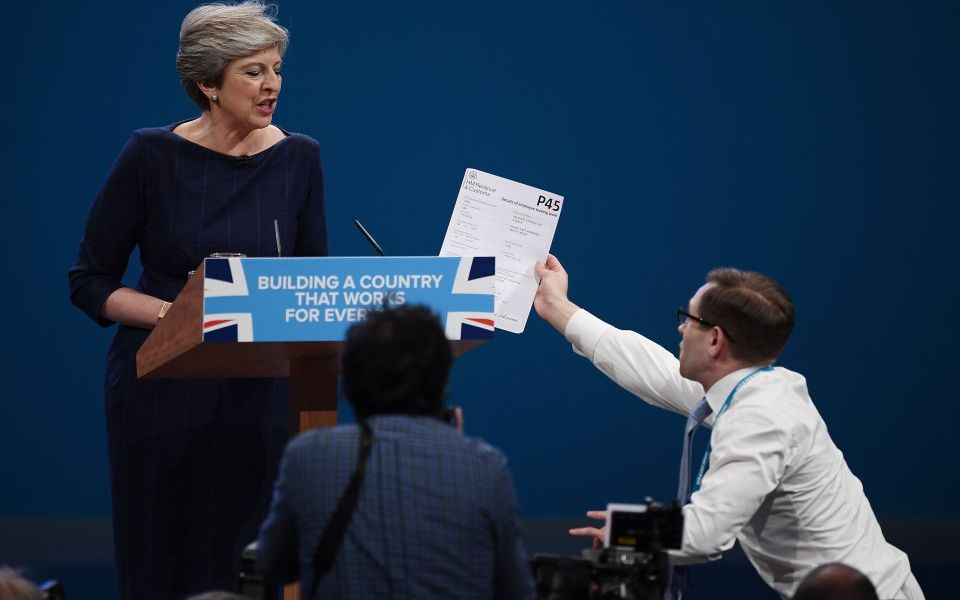Tips for Theresa May: Speak up, don’t cough, and try to keep the writing on the wall

It says something about how low the bar has dropped for your speech if your primary aim is to ensure that the letters on the sign behind the stage don’t start falling to the floor as you talk about building a strong economy.
Factor in a robust set, some industrial-strength cough sweets, and make sure security is on the lookout for bespeckled undercover comedians clutching P45 forms, and Theresa May’s speech at the 2018 Conservative party conference is guaranteed to be more successful than last year’s.
The trouble with May’s performance in 2017 was that it seemed to directly reflect her leadership after the disastrous election: almost too weak to speak, attacked on all fronts by protesters and falling scenery, and so excruciating to watch it felt like the entire room was secretly praying for the ordeal to be over.
Read more: Boris and Brexit to dominate party conference season… again
Such a calamity just wouldn’t have befallen a confident leader in full command of their party and message.
The Prime Minister may have been treated particularly dramatically by this form of rhetorical pathetic fallacy, but she is far from alone.
In fact, dig a little deeper, and you’ll find that history is full of speech mishaps and misjudgements that reveal an intriguing amount about the politicians involved.
Take hubris, for example. In 2014, Ed Miliband was on a confidence high, with politicians and pundits puffing up the likelihood of a Labour victory in May 2015.
Miliband – who at the time had a reputation for being slightly too clever for his own good – was determined to show off, delivering his speech off-by-heart, without an autocue. It almost went off without a hitch, until it emerged that he’d completely missed out the section of his speech that focused on the economy, specifically how Labour would reduce the deficit.
The Conservatives could not have dreamt of a better analogy for Labour’s disinterest in balancing the books, or Miliband’s carelessness.
A year later, it was Corbyn at the Labour conference podium, shoved into an ill-fitting suit in front of a crowd of adoring fans who had just propelled him from the backbenches to the top job.
Would he rise to the occasion and shake off the persona of an unremarkable and slightly doddery supply teacher? At least unlike Miliband he had a script to read.
Alas, again the autocue proved pivotal, when Corbyn doggedly read out the instruction “Strong Message Here”. Luckily, this could be explained as a side effect of his “authenticity”. Perhaps May should have tried that excuse last year.
Going further back, both Labour and the Conservatives have form when it comes to speeches that hit notes which, with the benefit of hindsight, look ridiculous.
Look at Neil Kinnock’s pre-election rally in 1992, when the exuberant leader shouted “we’re alright!” again and again – before Labour took a thorough beating in the election a week later.
Also in 1992, Peter Lilley, the new Conservative social security secretary, decided to fuse politics with musical theatre. He used his speech at the conference to rip off a song from The Mikado by Gilbert and Sullivan, laying into benefit scroungers through the medium of rhyme and rhythm.
Witty, yes, but also cringe-worthily elitist and out-of-touch. Sometimes playing it straight is safer than trying too hard to make a splash.
Then again, despite the many pitfalls of speech-giving, get it right and you’re a superstar. In particular, there’s something to be said for a zinging one-liner, that can turn audiences and fortunes – and ideally make everyone laugh in the process.
For the master of this, we probably have to look across the pond to that movie-star-turned-US-President Ronald Reagan, who knew far better than Lilley how to mix show business with politics.
Reagan’s showmanship is legendary, but certain lines stand out.
His joke – the nine most terrifying words in the English language are “I’m from the government, and I’m here to help” – epitomised in a single line his philosophy of free markets and a small state. His assurances to reporters in 1986 not to worry about the deficit because “it’s big enough to take care of itself” made an economic point while painting the President as utterly in control.
And in the 1984 election campaign, with a 73-year-old Reagan facing an opponent two decades his junior, he was able to turn the age gap to his advantage when asked if age was a factor in the election: “I am not going to exploit, for political purposes, my opponent’s youth and inexperience”. He went on to win 49 out of 50 states.
In a way, the closest Britain has had to that kind of quicksilver spark and charm in recent years was David Cameron. It’s impossible to forget his takedown of irate backbencher Nadine Dorries with his cheeky quip “I know that the honourable lady is extremely frustrated”, plunging the House of Commons into a collective fit of schoolboy laughter at the innuendo.
Cameron, who in his first PMQs as opposition leader derided Tony Blair with “he was the future once”, also had a wonderful sense of narrative coherence. In his final Commons address as Prime Minister, 11 years later, he concluded his premiership in style: “after all, as I once said, I was the future once”.
Of course, that might be a degree of rhetorical aplomb that May, fresh from her EU humiliation in Salzburg, finds hard to emulate. Let’s just hope that the letters all stay up on the stage this time.
Read more: May and Corbyn set out competing economic visions in major speeches